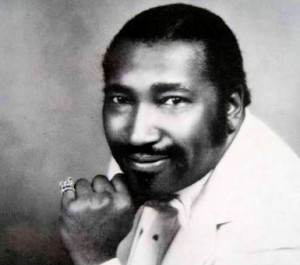Popular songs are a funny thing. What is it that makes some hit songs live on forever, while others are forgotten with the passage of time? Is there something in the melody or lyrics that give a song its staying power? I suppose that if anyone knew the answers they would be cranking out timeless hits on a regular basis.
The sad thing is that when hit records are forgotten, oftentimes the artists who created them are forgotten as well. Garland Green is a good example of this. I heard “Jealous Kind of Fella” on the radio recently and I immediately wondered where this hit record from 1969 had been for all of these years. And what ever became of Garland Green, the vocalist behind the great record? This column seeks to answer those questions.
Green was born in a small town in the southwestern corner of Mississippi near the Louisiana border. The year was 1942, and he was number ten in a family that eventually grew to 11 children. Green sang in his school choir in Leyland, a nearby town. When he was 16 he moved to Chicago to finish high school, and he had singing gigs on the weekend. That’s when Argia B. Collins entered Green’s life.
Collins saw him singing in a pool hall. She was a successful woman who owned a bunch of barbecue joints and even had her own line of barbecue sauce, which she called “Mumbo.” What Collins didn’t know was what to do with someone of Green’s talent, so she decided to pay his fare at the Chicago Conservatory of Music for a couple of years. Green studied voice and piano, and worked the clubs at night.
It was at one of those clubs, The Sutherland, that Mel Collins caught Green’s act. Green was the opener on a bill that included Lou Rawls and Earl Hines. Collins was married to Joshie Armstead, who had co-written hits like “Let’s Go Get Stoned,” and “Cry Like a Baby” with Nick Ashford and Valerie Simpson. Armstead loved Green’s voice as much as her husband did, and they decided to record him on their own label, the Detroit-based Gamma Records.
Green’s first single was called “A Girl Like You,” and it did so well locally that MCA Records picked up distribution, and put Green on their Revue Records imprint. He released three singles for Revue and MCA upped him to their main label, Uni.
“Jealous Kind of Fella” was Green’s first chart hit, reaching #5 on the Billboard R&B chart, #2 on the Cashbox soul chart, and #20 on the Billboard Hot 100. Writer’s credits on the song went to Green, Armstead, R. Browner, and M. Dollinson. The record was released in August of ’69 and had sold a million copies by March of ’71. The followup single didn’t sell well though, and in 1970 Green left MCA, which meant parting ways with Armstead, who helped to get him there in the first place.
Cotillion Records, a subsidiary of Atlantic, was the next stop for Green. He recorded five singles for the label, but only the Donny Hathaway-produced and arranged “Plain and Simple Girl” gained any traction, reaching the Top 20 on the R&B chart. By 1973 Green was recording for Spring Records, where he recorded five more singles. Only a couple of them reached the Top 100 on the R&B chart, “Let the Good Times Roll” (not the song that Shirley & Lee had a hit with), and “Bumpin’ and Stompin’.” Years later the UK label Ace/Kent Records compiled Green’s Spring singles for release.
By the way, Ace/Kent has released some amazing compilations over the years. Check out their website.
A stint with RCA Records was next for Green. There he released three singles and an album, all produced by Leon Haywood. A few years later Green moved to California and signed with an indie called Ocean-Front Records. Lamont Dozier and Arleen Schesel produced an album for Green there. When Ocean-Front went out of business, Green recorded and released records on his own. Four years ago Green signed with Special Soul Music. In February, 2012, he released his first album of new material in 29 years, the aptly titled I Should’ve Been the One.
If you’re like me, when you listen to the song below, it’s going to all come back to you. While it is sad and strange that great music is sometimes forgotten, it’s a wonderful feeling when it turns up again out of thin air.






Comments